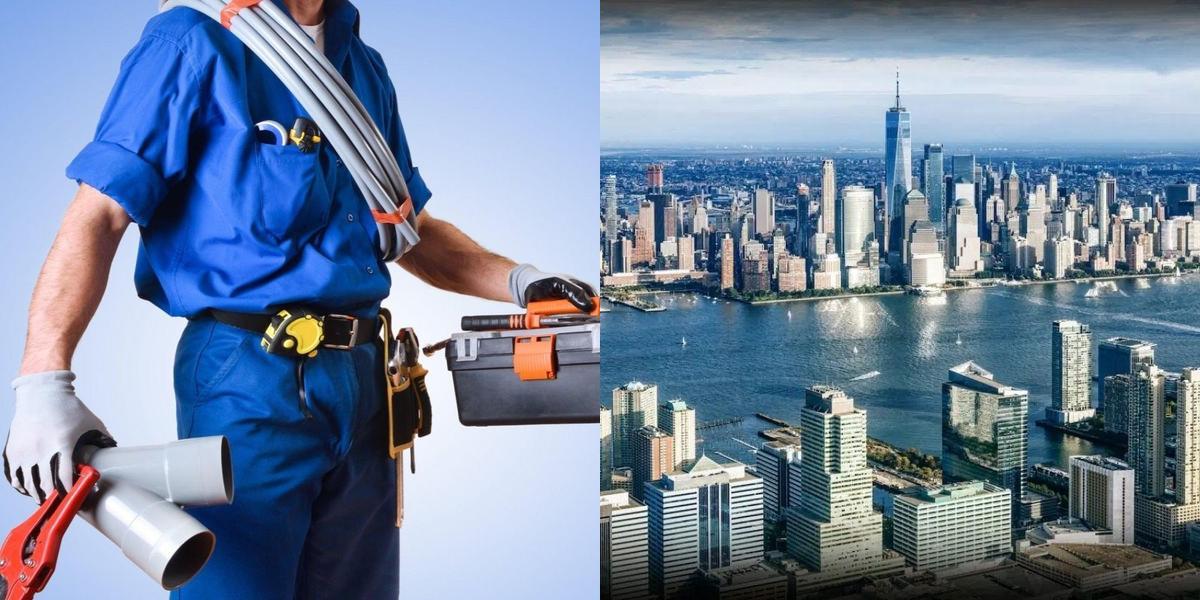How to Become a Plumber in New Jersey

What is a Plumber?
A plumber is a skilled professional who specializes in installing, repairing, and maintaining systems that involve pipes, fixtures, and fittings. Plumbers work with water supply, drainage, and heating systems in residential, commercial, and industrial buildings.
Responsibilities of a Plumber:
- Installing, repairing, and maintaining plumbing systems
- Reading and interpreting blueprints and building codes
- Identifying and fixing plumbing issues
- Inspecting plumbing systems for potential problems
- Collaborating with other construction professionals
Licensing and Certification
Once you have completed your education and training, the next step is to obtain a plumbing license and certification. The requirements for licensing vary by state, so it's important to familiarize yourself with the specific regulations in your area.
In most states, you will need to pass a licensing exam to become a licensed plumber. The exam typically covers topics such as plumbing codes, safety regulations, and trade practices. Some states also require a certain number of years of practical experience as an apprentice or journeyman plumber before you can take the exam.
In addition to licensing, many plumbers choose to pursue professional certifications to enhance their credentials and demonstrate their expertise in specialized areas of plumbing. Some of the most recognized certifications for plumbers include:
-
Certified Plumbing Professional (CPP): Offered by the Plumbing-Heating-Cooling Contractors Association (PHCC), this certification is designed for experienced plumbers who have a minimum of five years of field experience. The CPP certification covers topics such as plumbing codes, safety, and business management.
-
Journeyman Plumber Certification: This certification is typically obtained through a state licensing board or a trade organization. It validates your competency as a journeyman plumber and allows you to work independently without direct supervision.
-
GreenPlumbers Certification: This certification focuses on environmentally sustainable plumbing practices and is offered by the GreenPlumbers Training and Accreditation program. It covers topics such as water efficiency, solar hot water, and climate care.
How do I get a job as a Plumber?
Once you have obtained your plumber certification, you are ready to start your career in the plumbing industry. Here are some steps to help you land a job as a plumber:
-
Build a strong resume: Highlight your education, training, and certifications on your resume. Include any relevant work experience, such as apprenticeships or internships. Emphasize your skills and knowledge of plumbing systems, tools, and techniques.
-
Network: Reach out to individuals in the plumbing industry, such as experienced plumbers, plumbing contractors, or trade organizations. Attend industry events, conferences, and trade shows to connect with professionals in the field. Networking can lead to job opportunities and valuable connections.
-
Apply for jobs: Look for plumbing job openings on job boards, company websites, and trade publications. Submit your resume and cover letter, highlighting your qualifications and expressing your interest in the position. Consider applying to plumbing companies, construction firms, or government agencies that require plumbing services.
-
Prepare for interviews: Research the company you are interviewing with and familiarize yourself with their services, projects, and values. Be prepared to answer questions about your experience, skills, and problem-solving abilities. Highlight your certifications and any specialized training you have received.
-
Gain practical experience: If you are a recent graduate or have limited experience in the field, consider taking on entry-level positions or internships to gain practical experience. This can help you build your skills, network, and establish a track record of success.
-
Stay updated on industry trends: Plumbing technology and practices are constantly evolving. Stay up-to-date with the latest industry trends, codes, and regulations. Attend workshops, seminars, and training programs to enhance your knowledge and skills.
Career Paths and Opportunities after Becoming a Plumber
Becoming a certified plumber can open doors to a wide range of career paths and opportunities. Here are a few options to consider:
-
Residential plumber: Many plumbers work in residential settings, installing and repairing plumbing systems in homes, apartments, and condominiums. This can include tasks such as fixing leaks, installing fixtures, and unclogging drains.
-
Commercial plumber: Commercial plumbers work on larger-scale projects, such as office buildings, hotels, and shopping centers. They may be involved in installing and maintaining plumbing systems for commercial spaces.
-
Industrial plumber: Industrial plumbers work in industrial settings, such as factories, power plants, and manufacturing facilities. They may be responsible for installing and maintaining plumbing systems that support industrial processes.
-
Construction plumber: Construction plumbers work on new construction projects, installing plumbing systems in residential and commercial buildings. They may collaborate with architects, engineers, and other construction professionals to ensure plumbing systems meet building codes and specifications.
-
Service plumber: Service plumbers specialize in troubleshooting and repairing plumbing issues. They may work for plumbing companies or operate their own businesses, responding to customer calls for plumbing repairs, maintenance, and emergencies.
-
Pipefitter: Pipefitters work with high-pressure piping systems in industrial settings, such as oil refineries, chemical plants, and power plants. They install, repair, and maintain pipes that transport liquids and gases.
-
Backflow prevention specialist: Backflow prevention specialists focus on preventing the reverse flow of contaminated water into the potable water supply. They install and maintain backflow prevention devices and ensure compliance with local regulations.
Final Thoughts
Becoming a certified plumber requires a combination of education, training, and practical experience. By completing a vocational program or apprenticeship, passing the licensing exam, and obtaining professional certifications, you can establish yourself as a qualified and competent plumber. With the right skills and credentials, you can pursue a variety of career paths in the plumbing industry. Whether you choose to work in residential, commercial, or industrial settings, there are plenty of opportunities to grow and succeed as a certified plumber. So, take the first step towards your plumber certification and start building a rewarding career in the plumbing industry.
Looking for a better fit? These other articles could be more in line with your expectations if this one isn't precisely what you had in mind:




